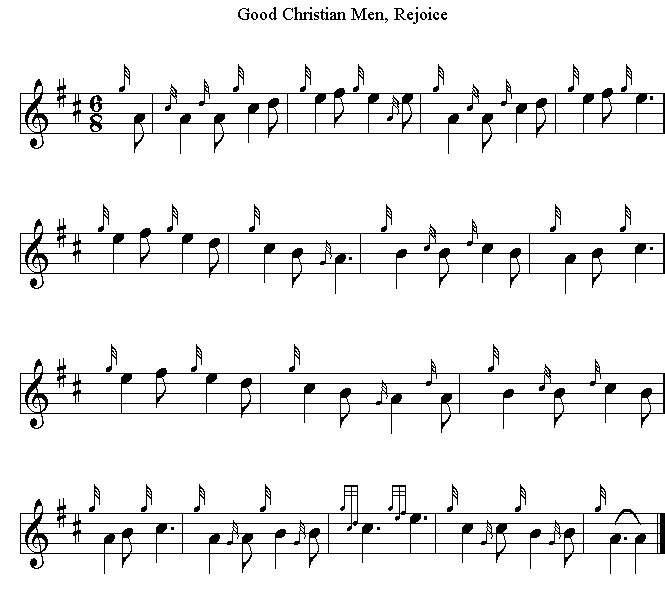 |
|

Best viewed in
|
Good Christian Men, Rejoice "In dulci jubilo" (Latin for "In sweet rejoicing") is a macaronic text of German and Latin dating from the Middle Ages. The original song text is thought to have been written by the German mystic Heinrich Seuse circa 1328. The tune first appears in Codex 1305, a manuscript in Leipzig University Library dating from c. 1400, although it has been suggested that the melody may have existed in Europe prior to this date. In print, the tune was included in Geistliche Lieder, a 1533 Lutheran hymnal by Joseph Klug. It also appears in Michael Vehe's Gesangbuch of 1537. In 1545, another verse was added, possibly by Martin Luther. This was included in Valentin Babst's Geistliche Lieder, printed in Leipzig. The melody was also popular elsewhere in Europe, and appears in a Swedish/Latin version in the 1582 Finnish songbook Piae Cantiones, a collection of sacred and secular medieval songs. The tune appears in several collections by Michael Praetorius. There have been a number of translations of the Latin/German poem into English. The most popular that keeps the macaronic structure is R. L. de Pearsall's 1837 translation, which retains the Latin phrases and substitutes English for German. A looser translation produced in 1853 by John Mason Neale titles the work "Good Christian Men, Rejoice". John M. Neale's life is a study in contrasts: born into an evangelical home, he had sympathies toward Rome; in perpetual ill health, he was incredibly productive; of scholarly temperament, he devoted much time to improving social conditions in his area; often ignored or despised by his contemporaries, he is lauded today for his contributions to the church and hymnody. Neale's gifts came to expression early–he won the Seatonian prize for religious poetry eleven times while a student at Trinity College, Cambridge, England. He was ordained in the Church of England in 1842, but ill health and his strong support of the Oxford Movement kept him from ordinary parish ministry. So Neale spent the years between 1846 and 1866 as a warden of Sackville College in East Grinstead, a retirement home for poor men. There he served the men faithfully and expanded Sackville's ministry to indigent women and orphans. He also founded the Sisterhood of St. Margaret, which became one of the finest English training orders for nurses. Laboring in relative obscurity, Neale turned out a prodigious number of books and artic1es on liturgy and church history, including A History of the So-Called Jansenist Church of Holland (1858); an account of the Roman Catholic Church of Utrecht and its break from Rome in the 1700s; and his scholarly Essays on Liturgiology and Church History (1863). Neale contributed to church music by writing original hymns, including two volumes of Hymns for Children (1842, 1846), but especially by translating Greek and Latin hymns into English. These translations appeared in Medieval Hymns and Sequences (1851, 1863, 1867), The Hymnal Noted (1852, 1854), Hymns of the Eastern Church (1862), and Hymns Chiefly Medieval (1865). Because a number of Neale's translations were judged unsingable, editors usually amended his work, as evident already in the 1861 edition of Hymns Ancient and Modern; Neale claimed no rights to his texts and was pleased that his translations could contribute to hymnody as the "common property of Christendom."
Lyrics by John Mason Neal
Good Christian friends, rejoice
Good Christian friends, rejoice
Good Christian friends, rejoice |
